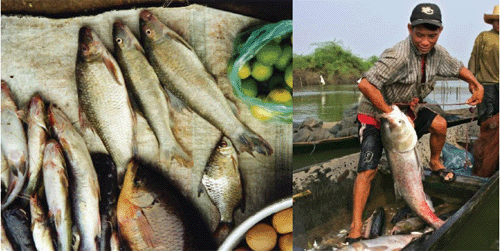Understanding Mekong fisheries and improving productivity - the Fisheries Programme (FP)

The Lower Mekong Basin is the world's largest single freshwater fishery, with an estimated yield of 1.5- 2.5 million tonnes per year and a total value of at least US$ 2 billion. Fisheries products are the primary source of animal protein, calcium and Vitamin A for many people in the Basin. Fish are essential for food security and livelihoods, especially for the majority of the people in the Basin who live in poverty.
The MRC's objective is to coordinate the sustainable development, utilisation, management and conservation of the fisheries of the Mekong under four components:
- Programme Management and Communication;
- Fisheries Ecology, Valuation and Mitigation;
- Fisheries Management and Governance; and
- Aquaculture of Indigenous Mekong Fish Species.
Programme Management and Communication
The major outcome of the Fisheries Programme in 2008 has been
the incorporation of fisheries considerations into planning
for proposed dam development in the Mekong. The Programme produced
technical reports on dams and fisheries, presented information
at many meetings and forums, convened at an expert group meeting
on dams as barriers to fish migration, developed models examining
impacts of dams on fisheries, and actively engaged with other
programmes of MRC as well as other agencies regarding dam development.
It is now widely recognised that the primary negative impact
of dams is on fisheries production, and that this is an important
issue in the Mekong given the dependency of people on fisheries
for food security, nutrition and employment. The analysis undertaken
by the Programme will provide a significant input into the Strategic
Environmental Assessment of proposed hydropower on the Mekong
Mainstream being implemented by the MRC in 2009.

During 2008, the Programme continued to publish the results of its work in English and riparian languages. Publications included:
- A book entitled "Field Guide to Fishes of the Mekong Delta";
- Technical papers on rice field fisheries in Cambodia, and socio-economics of fisheries in the Songkhram River Basin in Thailand; and
- Three issues of the regular Mekong fisheries newsletter (now in its 14th year of production) in English, as well as omnibus editions in all riparian languages.
Fisheries Ecology, Valuation and Mitigation
The MRC has fast-tracked several activities to deliver information
specifically related to the possible impacts of the dams on
fish migration, spawning and fisheries production. In 2008,
a number of activities were undertaken to this end, including
modelling the impact of dams on migratory fish and developing
a project to identify important spawning grounds in the Mekong.
Studies continued on monitoring the trends in selected fisheries
and the impact of water management on fisheries production.
A project began with the objective of defining the economic
and non-economic value of fisheries in the Mekong, as this information
is essential for planners in determining how to best use the
Mekong's water and related resources.
Also on-going throughout 2008 was the continued refinement of the modelling system to analyse the relationship between the catch of dai fishery in the Tonle Sap system and the hydrology of the system. The analyses clearly show that higher floods result in bigger and more fish. Analyses of other fisheries databases have been initiated. The results of these analyses will provide a solid foundation for evaluating the impact of changes in hydrology on fisheries production.

Fisheries Management and Governance
The Technical Advisory Body for Fisheries Management conducted
training events on trans-boundary fisheries management in all
MRC Member Countries. These have led to cooperative arrangements
for shared fisheries management activities on the Cambodian-Viet
Nam border. Work continued with local communities and fisheries
agencies to develop co-management practices for fisheries.
Aquaculture of Indigenous Mekong Fish Species
The MRC has continued to run a series of workshops on the breeding
and husbandry of selected fish species, with the overall aim
of extending fish breeding expertise of indigenous species across
the region. Through this training, expertise can spread across
all riparian countries. The project is also gathering a database
of the genetics of the primary aquaculture species, to assist
with planning the ecologically appropriate dispersion of fish,
including programmes to restock natural water bodies and rivers.
Choose a newsletter: